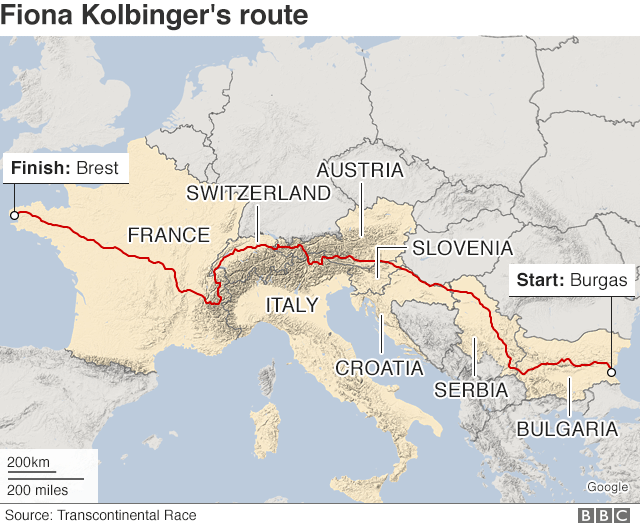Transcontinental Race: Germany's Fiona Kolbinger becomes first female winner of endurance race
- Published

Fiona Kolbinger is congratulated by fellow rider Bjorn Lenhard at the finish line in Brest
Germany's Fiona Kolbinger has beaten more than 200 men to become the first woman to win the Transcontinental Race, cycling more than 2,485 miles across Europe in just over 10 days.
The cancer researcher, 24, endured thunderstorms, scorching heat and icy rain in the solo race, which took her from Burgas, Bulgaria to Brest in north west France via five other countries.
After finishing in a time of 10 days, two hours and 48 minutes, Kolbinger says she could have "gone harder", adding: "I could have slept less."
Britain's Ben Davies took second place, reaching the finish more than 10 hours behind Kolbinger, in 10 days, 13 hours and 10 minutes.

"I am so, so, surprised to win," said Kolbinger, who was one of 265 riders taking part, of which 40 were women. "When I was coming into the race I thought that maybe I could go for the women's podium, but I never thought I could win the whole race."
Transcontinental was launched in 2013, beginning in London and finishing in Istanbul, with Belgium's Kristof Allegaert winning the opening two events before Josh Ibett became the first British rider to win the endurance race in 2015.
How does the race work?
Competitors must follow strict rules throughout the route, which guides them through seven or more countries, including Austria, Bulgaria, Bosnia, Croatia, France, Italy, Kosovo, Serbia, Slovenia and Switzerland.
Racers can choose their own route but must pass through four control points, taking them over varied terrain that includes gravel tracks and tough climbs, such as the zigzag road of the Timmelsjoch pass at an altitude of 2,474m in the South Tyrol at the border between Italy and Austria.
The cyclists are not allowed to ask anybody the way or receive technical support from anyone else, and must find their own food and accommodation.